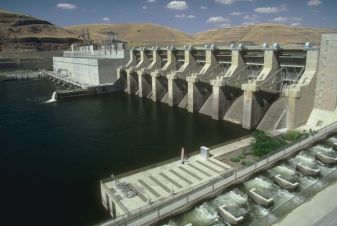forum
library
tutorial
contact

Keeping the Lights On as We
Transition to a Clean Energy Future
by George Caan & Kent Lopez
Sequim Gazette, October 20, 2021
|
the film forum library tutorial contact |

|
Keeping the Lights On as We
by George Caan & Kent Lopez
|
We will fail if we don't fully understand the ramifications of our policy decisions today.
We must prioritize reliability and affordability along with decarbonization.
 Keeping the lights on as we transition to a clean energy future -- lessons from California.
Keeping the lights on as we transition to a clean energy future -- lessons from California.
Recently, the state of California took the extraordinary step of walking back its clean energy laws and federal environmental regulations as the state's electricity needs threatened to exceed available energy. Without this quick action, Californians faced brownouts. Over-reliance on wind and solar failed in California, increasing carbon emissions as the state now has to temporarily operate carbon-emitting gas and diesel generators to support the grid.
This is not just a California issue; we have already had near misses in Washington. During the heatwave this past summer, the region's largest federal energy supplier, the Bonneville Power Administration, urged electricity consumers in Eastern Washington to conserve energy to avoid brownouts. While the lower Snake River dams saved the day, running at full capacity to provide hydropower, the incident was a shot across the bow -- a California-esque warning that if we aren't smart with our transition to a clean energy future, we will be left in the dark, literally.
Washington state's recently updated State Energy Strategy outlines ambitious goals to use the state's clean energy to electrify other sectors of our economy to reduce carbon emissions, namely transportation and buildings. This will significantly increase electricity demand.
The strategy states, "The modeling suggests that electricity demand in Washington could grow by 13-20% over 2020 levels by 2030. Electricity demand then accelerates and by 2050 is up to 92% above the 2020 level."
At the same time demand is projected to increase, Washington utilities are mandated under the state's clean energy laws to eliminate carbon-emitting energy resources such as coal and natural gas.
In addition, there are calls to remove dams that generate carbon-free electricity and are critical to integrating intermittent energy resources such as wind and solar that only produce electricity when the wind is blowing and the sun is shining.
As we make this transition to our clean energy future, we must prioritize the reliability of the electric grid and the affordability of this essential service. Energy policies, regulations, and rules that seek to overturn the laws of physics will fail us. Such policies have already failed California. We must ensure our electricity resources and grid are not just clean but also reliable and affordable. Remove one leg of the three-legged stool and our clean energy future collapses.
Striving for cleaner sources of energy is a laudable goal. Renewable energy is one way to get there, including hydropower, which is not only clean and renewable, but is available 24 hours a day, unlike solar and wind generation. Nuclear energy is also a non-emitting generating resource and is also available 24 hours a day.
We must consider cleaner, more efficient natural gas generation as well. We should do everything we can, with attention to reliability and affordability, to bring resources online that can power our economy, generate less carbon and not be a financial burden to our citizens and communities.
We can achieve our goals; a clean energy future with high reliability and low costs. We will fail, however, if we don't fully understand the ramifications of our policy decisions today. We must prioritize reliability and affordability along with decarbonization.
We must learn from California to avoid becoming California.
learn more on topics covered in the film
see the video
read the script
learn the songs
discussion forum
